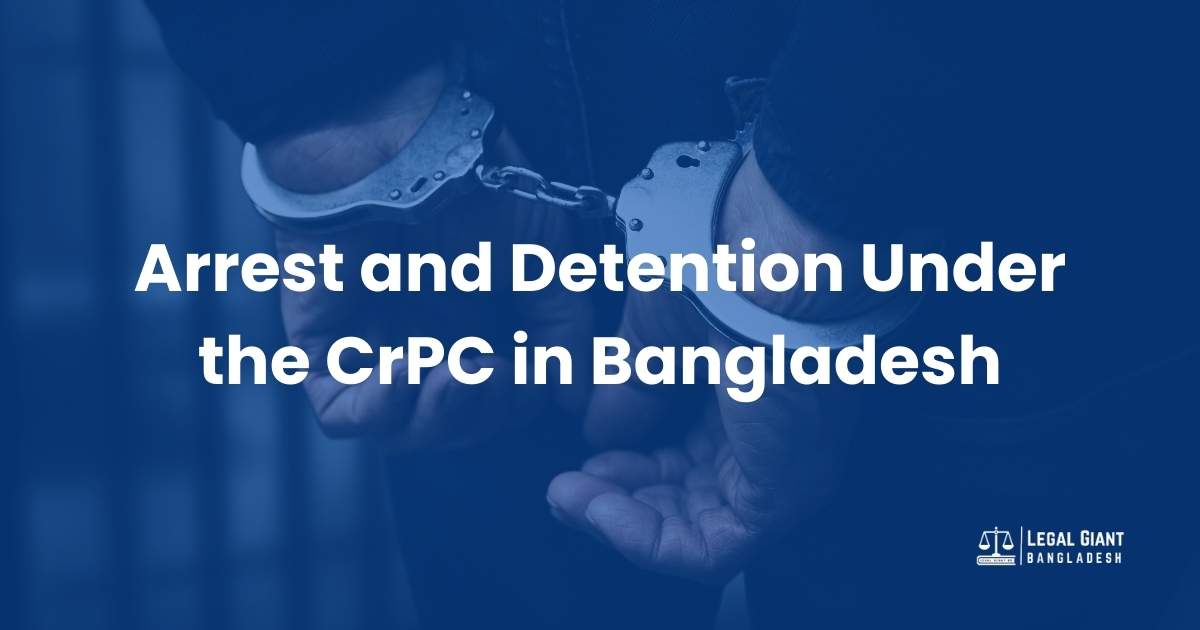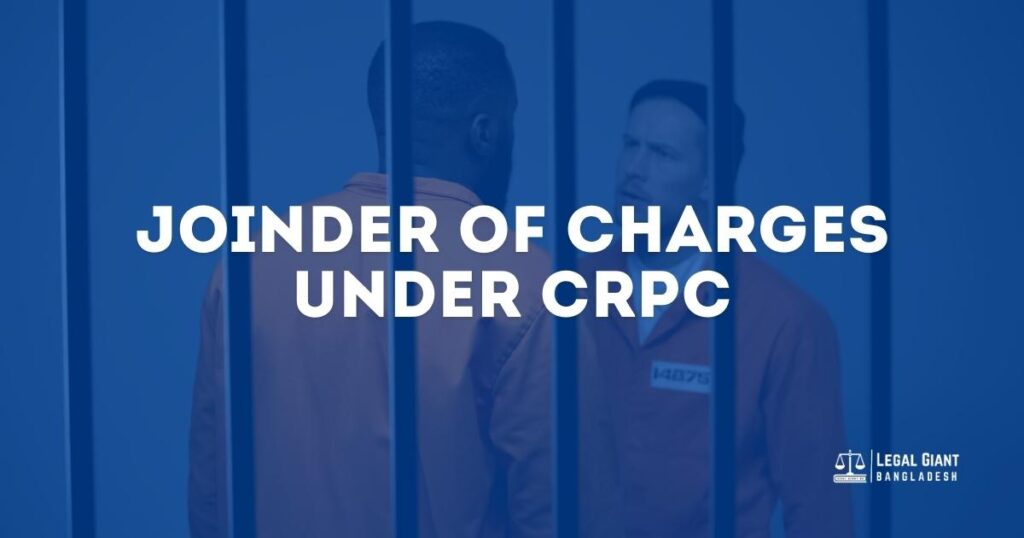Arrest and detention are integral components of criminal justice systems worldwide, ensuring that offenders are brought to justice while safeguarding individual liberties. In Bangladesh, these processes are governed primarily by the Code of Criminal Procedure, 1898 (CrPC). This article explores the procedural, legal, and constitutional aspects of arrest and detention under the CrPC, emphasizing the balance between state authority and individual rights.

Definition of Arrest Under the CrPC
Arrest involves the act of taking a person into custody under lawful authority to compel their appearance before a court or to ensure the prevention of a crime. The CrPC does not explicitly define “arrest,” but it outlines the process and powers associated with it under various provisions.
The key objectives of an arrest include:
- Preventing an individual from committing further crimes.
- Ensuring compliance with a court’s order.
- Facilitating an investigation.
Legal Provisions Governing Arrest
Powers to Arrest Without Warrant
Section 54 of the CrPC empowers police officers to arrest individuals without a warrant under specific circumstances, such as:
- Cognizable Offenses: When a person is suspected of committing a cognizable offense.
- Preventive Arrests: To prevent a possible breach of peace.
- Escape Prevention: When a person attempts to escape lawful custody.
Arrest With a Warrant
Section 72 of the CrPC requires police officers to execute arrests with a warrant issued by a magistrate in non-cognizable offenses.
Guidelines for Arrest
The Supreme Court of Bangladesh in the case of BLAST v. Bangladesh (2003) established safeguards for arrests, mandating police officers to justify arrests made under Section 54 and other provisions.
Rights of an Arrested Person
The rights of an arrested individual are enshrined in both statutory laws and the Constitution of Bangladesh. The rights of an arrested person include:
- Right to Information: Section 50 of the CrPC requires police to inform the arrested person of the grounds of arrest.
- Right to Bail: Non-cognizable and bailable offenses allow for bail, ensuring the accused can avoid unnecessary detention.
- Right to Be Presented Before a Magistrate: Article 33(2) of the Constitution mandates that an arrested individual be brought before a magistrate within 24 hours.
- Protection Against Torture: Article 35(5) of the Constitution prohibits torture or inhuman treatment of an arrested individual.
- Right to Legal Representation: Arrested persons have the right to consult a lawyer.
Also Read: Rights of Prisoners in Bangladesh
Detention Under the CrPC
Detention refers to holding an individual in custody for investigative or preventive purposes. While arrest usually precedes detention, not all detentions follow an arrest.
Types of Detention
- Police Custody: Section 167 of the CrPC allows detention for investigation purposes, typically not exceeding 15 days with magistrate approval.
- Preventive Detention: Governed under special laws like the Special Powers Act, 1974, this aims to prevent individuals from committing acts prejudicial to state security.
- Judicial Custody: After the remand period, individuals may be transferred to judicial custody pending trial.
Distinction Between Arrest and Detention
Arrest and detention are closely related but distinct legal processes within the criminal justice framework of Bangladesh. While both involve restricting an individual’s freedom, their purposes, initiation procedures, and legal implications differ significantly. The table below summarizes the key distinctions:
| Aspect | Arrest | Detention |
| Definition | Arrest is the act of taking a person into custody by legal authority to ensure compliance with the law or court orders. | Detention refers to holding an individual in custody, typically for investigative, preventive, or judicial purposes. |
| Objective | To take immediate custody of a person to initiate legal action or investigation. | To restrict a person’s freedom temporarily, either as a preventive measure or during ongoing investigations. |
| Legal Basis | Governed under Sections 54, 72, and related provisions of the CrPC. | Governed under Sections 167 of the CrPC, along with specific laws like the Special Powers Act, 1974. |
| Authority to Initiate | Police or other law enforcement agencies under lawful authority. | Magistrates or courts often authorize detention after considering legal grounds. |
| Initiation Process | Requires immediate physical custody of an individual. | Typically follows arrest or court proceedings, requiring explicit judicial approval. |
| Duration | An individual can be held for up to 24 hours without being presented before a magistrate (as per Article 33 of the Constitution). | Detention duration can vary but is subject to judicial oversight, with police custody capped at 15 days under Section 167 of the CrPC. |
| Grounds for Action | Suspicion or involvement in a cognizable offense, breach of peace, or court order. | Preventive measures to avoid harm, furtherance of investigation, or ongoing judicial processes. |
| Rights of Individuals | The arrested individual has the right to be informed of the grounds of arrest and to consult a lawyer (Article 33 of the Constitution, Section 50 of the CrPC). | Rights include legal representation, safeguards against torture, and periodic judicial review of detention. |
| Outcome | Leads to either detention, release, or formal legal proceedings. | May lead to extended custody, release, or initiation of formal charges. |
Procedures for Lawful Arrest
To ensure a lawful arrest, adherence to procedural guidelines is crucial:
- Documentation: Police must maintain a detailed record of the arrest.
- Grounds for Arrest: Grounds must be clearly communicated to the arrested individual.
- Witness Presence: Arrests made at a residence require witness presence under Section 100 of the CrPC.
- Medical Examination: To avoid allegations of torture, the detained individual must undergo a medical check-up.
Grounds for Unlawful Arrest and Remedies
Unlawful arrests occur when police act without proper authority or justification. Common grounds include:
- Arrests without reasonable suspicion.
- Failure to inform the accused of their rights.
- Excessive use of force during arrest.
Remedies
- Habeas Corpus: Article 102 of the Constitution allows individuals to challenge unlawful detention through writ petitions.
- Compensation: Courts may award compensation for wrongful arrests, as seen in Meghna Petroleum Ltd v. Bangladesh (2002).
- Departmental Action: Officers responsible for unlawful arrests may face disciplinary proceedings.
Detention and Bail Provisions
Detention and bail are interlinked in the criminal justice process. Understanding Detention and Bail Provisions ensures that individuals can safeguard their liberty.
Bail Types
- Regular Bail: Granted during trial proceedings.
- Anticipatory Bail: Available to individuals fearing arrest, under Section 498 of the CrPC.
- Interim Bail: Granted temporarily until a final decision is made.
Denial of Bail
Courts may deny bail in cases involving:
- Serious crimes, such as murder or terrorism.
- Risk of evidence tampering.
- Flight risk of the accused.
Judicial Oversight and Accountability
Judicial oversight plays a pivotal role in maintaining the integrity of arrests and detentions. Key aspects include:
-
- Magistrate’s Role: Ensuring compliance with legal procedures during initial appearances.
- Supervisory Jurisdiction: Higher courts oversee lower courts to prevent misuse of authority.
- Case Precedents: Judicial decisions act as safeguards against arbitrary practices.
Conclusion
The legal framework for arrest and detention under the Code of Criminal Procedure in Bangladesh aims to strike a balance between enforcing law and protecting individual freedoms. Proper understanding and adherence to these provisions safeguard against abuse and ensure justice is upheld.
FAQs About Arrest and Detention Under the CrPC in Bangladesh
What Is the Maximum Duration of Police Custody Under the Cr Pc?
Under Section 167 of the CrPC, police custody can extend up to 15 days with magistrate approval.
Are All Offenses Bailable Under the Cr Pc?
No, Offenses Are Categorized as Bailable and Non-Bailable, with The Latter Subject to Judicial Discretion.
What Remedies Are Available for Unlawful Arrests?
Remedies Include Filing a Writ of Habeas Corpus, Seeking Compensation, or Initiating Departmental Proceedings.
Can an Arrested Person Be Held without Being Presented Before a Magistrate?
No, the Constitution Mandates Presentation Within 24 Hours of Arrest, Barring Preventive Detention Cases.
What Is Anticipatory Bail?
Anticipatory bail is a pre-arrest legal remedy allowing individuals to avoid detention, granted under Section 498 of the CrPC.


